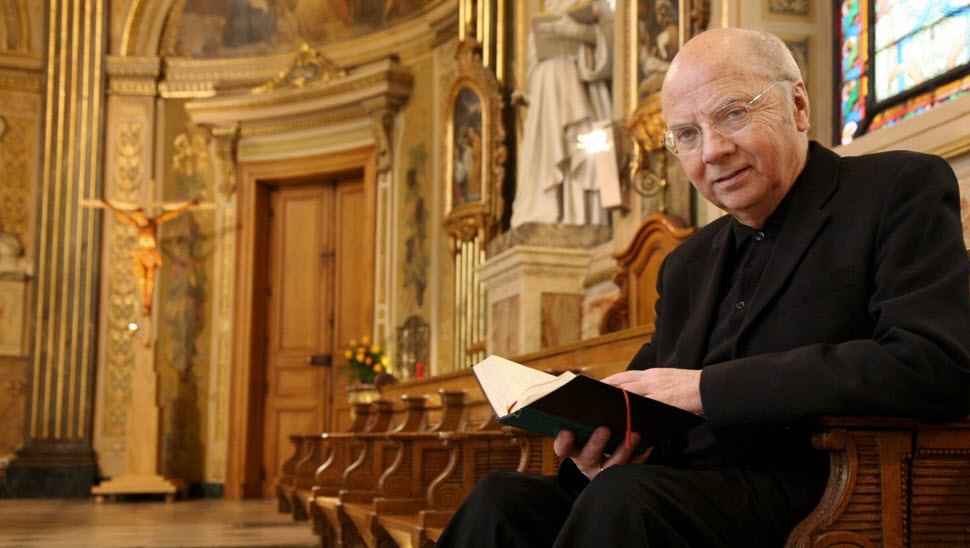Maryam Rajavi’s message on the passing of Bishop Jacques Gaillot

Jacques Gaillot was a brother for us and for our oppressed people
Bishop Jacques Gaillot, a prominent French priest, passed away on April 12, 2023, due to pancreatic cancer at the age of 87.
Bishop Gaillot was known as an advocate for progressive causes in France. For 13 years, he served as the bishop of Evreux in France before being reassigned to the bishopric of Parthenia in Africa due to his progressive views. There, he transformed the church into a sanctuary for the underprivileged and homeless, earning widespread admiration and support. In addition to his work in France and Africa, Bishop Jacques Gaillot was a staunch defender and supporter of the Iranian Resistance.
For the Iranian Resistance and me, he was a compassionate brother who stood with us during times of hardship. He was among the first to offer comfort, his constant smile, deep gaze, and concise yet profound words providing solace to all.
As a champion of interfaith solidarity and universal human values, he embodied the very essence of brotherhood in action. Driven by an unwavering sense of duty to humanity, he dedicated himself to opposing oppression and injustice, earning recognition as one of the foremost champions of social justice alongside the Iranian Resistance.
In a letter addressed to me, he expressed his conviction in the ultimate triumph of the Iranian people: “Though many battles still lie ahead, hope endures.”
In France, Jacques Gaillot was ranked second only to Abbé Pierre as a popular priest. Like Abbé Pierre, he viewed it as his sacred mission to protect and defend the members of the Iranian Resistance, including the PMOI.
Jacques Gaillot was born in Saint-Dizier, France, on September 11, 1935. He earned a bachelor’s degree in theology and was ordained a priest in 1961.
In 1987, when the French government illegally deported Iranian political refugees to Gabon in a deal with the mullahs’ dictatorship, Jacques Gaillot and Daniel Mitterrand were among the first to visit Iranians who had gone on a hunger strike at the headquarters of the UN High Commissioner for Refugees in Paris, demanding the return of the refugees to France.
This bond with the Iranian Resistance remained unbroken. When the French government once again arrested Iranian refugees and members of the National Council of Resistance of Iran in collaboration with the mullahs’ regime on June 17, 2003, Bishop Gaillot was one of the first to come to Auvers-sur-Oise and defend the Iranian Resistance.
Following his earlier involvement with the Iranian Resistance, Bishop Gaillot continued to take an active role in protecting the members of the People’s Mojahedin Organization of Iran (PMOI) in Ashraf and Camp Liberty in Iraq. These members were targeted by successive attacks carried out by the IRGC and their Iraqi mercenaries.
In addition, Bishop Gaillot was very active in the PMOI’s legal and political battle to remove the organization from the EU blacklist.
After meeting with Pope Francis during a visit to the Vatican in 2015, he sent a video message to mark the 50th anniversary of the foundation of the People’s Mojahedin of Iran Organization (PMOI/MEK). In this message, he said: “My friends, on this golden anniversary of the Iranian Resistance, I have a message that I hold dear: stand until the end. You know that when you get into resistance, what is impressive is the persistence in it. When after 50 years I see Iranians who are still resisting, it’s wonderful!”
His message went on, “Despite the many challenges, I remain hopeful that the Resistance will emerge victorious, even if I am not here to witness it. There will be those who will see it.”
He lamented the complicity of the powerful and the media’s deafening silence on the clerical regime’s atrocities and the Iranian resistance’s efforts to combat them.
He never failed to expose the massacre of 30,000 political prisoners in 1988. In a ceremony in 2018, he said: “This barbaric massacre of thousands of young political prisoners constitutes a crime against humanity that will forever be remembered in history. Such an immense tragedy cannot be concealed and must be prosecuted.”
He added: “The perpetrators of the murder of countless martyrs and the residents of Ashraf, have evidently forgotten that martyrs are the very seeds of life and rebellion. They have forgotten that their deaths will not be in vain. Today, we draw strength from their light and continue to fight on.”
I met with him on May 5, 2017, to congratulate the remarks by Pope Francis and the Mufti of Al-Azhar in Cairo on the solidarity between Muslims and Christians. They had called on followers of different religions to stand in solidarity against extremism and terrorism. Bishop Gaillot said, “Islam is a religion of brotherhood.”
He understood the PMOI’s outlook that “a tolerant and democratic Islam is different from what the extremists promote under the name of Islam.” He said, “I think that a free Iran emancipated from the grip of religious fundamentalists will play a decisive role in ending religious extremism and promoting peace and brotherhood in the (Middle East) region and the world.”
He who loved all members of the People’s Mojahedin and defended them for long years, went to Albania in October 2016 to visit them.
On December 15, 2018, at an international conference at the Iranian Resistance’s headquarters, he said, “Among you, I feel I am among my own family. I had the same feeling in Ashraf-3, and I can never forget the memory of visiting them a few years ago.”
His words following the 2018 uprisings in Iran still resonate today: “A nation has risen up, including a young generation, to overthrow a regime that is completely terrified. The destiny of a nation cannot be halted. The martyrs sowed in tears, and we will reap in joy.”
- Tags: NCRI

